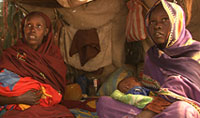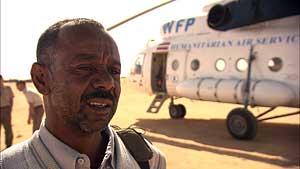“A compelling account of the deadly conflict in western Sudan”
–United Features Syndicate
Read the latest news on the crisis in Darfur.
ABOUT THE ISSUE
 In the half-century since Sudan was granted independence from colonial rule, the country has been in a chronic state of civil war. Most of the fighting has been between the Arab-controlled central government in Khartoum and rebels in the predominantly Christian and animist south. But in 2003, rebels in the Darfur region of western Sudan — a predominantly black, Muslim area — rose up against the central government, angered by the economic and political marginalization of their region.
In the half-century since Sudan was granted independence from colonial rule, the country has been in a chronic state of civil war. Most of the fighting has been between the Arab-controlled central government in Khartoum and rebels in the predominantly Christian and animist south. But in 2003, rebels in the Darfur region of western Sudan — a predominantly black, Muslim area — rose up against the central government, angered by the economic and political marginalization of their region.
In response, government-backed militias known as the janjaweed began a “scorched earth” campaign — riding on horseback, the janjaweed looted shops, raped women, and burned entire villages to the ground. Five years later, United Nations officials estimate that as many as 300,000 people may have been killed, and more than 2.5 million have been displaced.
ABOUT THE FILM
The film Heart of Darfur captures the desperation of daily life in remote villages, crowded refugee camps and in El Fasher, the once sleepy capital of North Darfur that is now home to 100,000 refugees and 10,000 U.N. personnel.
 Heart of Darfur takes a look at the people and places affected by the world’s largest humanitarian crisis. Our cameras follow the people working to bring an end to the conflict and suffering, such as Mohamed Siddig Suliman, a Darfuri aid worker who has been working in the region for more than 20 years. We travel into the expanding Sahara desert with Siddig, where, he explains, three decades of drought conditions have led to fighting over scarce resources—one of the root causes of the conflict in Darfur.
Heart of Darfur takes a look at the people and places affected by the world’s largest humanitarian crisis. Our cameras follow the people working to bring an end to the conflict and suffering, such as Mohamed Siddig Suliman, a Darfuri aid worker who has been working in the region for more than 20 years. We travel into the expanding Sahara desert with Siddig, where, he explains, three decades of drought conditions have led to fighting over scarce resources—one of the root causes of the conflict in Darfur.
 We also meet General Martin Luther Agwai, the former head of the Nigerian Armed Forces, who now leads UNAMID, the joint U.N./African Union peacekeeping mission in Darfur. The film follows Gen. Agwai as he helicopters into hostile areas to meet with leaders of various rebel factions. We learn that he is concerned about the fragmentation of the rebel groups, the logistics of UNAMID’s deployment, the expectations on the mission, and the limits of his power. Still, Gen. Agwai manages to have a positive outlook.
We also meet General Martin Luther Agwai, the former head of the Nigerian Armed Forces, who now leads UNAMID, the joint U.N./African Union peacekeeping mission in Darfur. The film follows Gen. Agwai as he helicopters into hostile areas to meet with leaders of various rebel factions. We learn that he is concerned about the fragmentation of the rebel groups, the logistics of UNAMID’s deployment, the expectations on the mission, and the limits of his power. Still, Gen. Agwai manages to have a positive outlook.
“It is in our culture in Africa that everywhere we are our brothers’ keepers,” he says.
